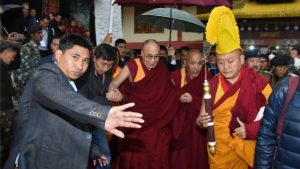 With an upset China watching closely, Tibetan spiritual leader, the Dalai Lama, has begun a week-long visit to India’s northeastern state of Arunachal Pradesh. The visit has raised the hackles in Beijing and looks set to fuel fresh tensions in Sino-Indian ties. Brushing aside Beijing’s strong objections, India has asked China to refrain from stoking “an artificial controversy” around the Dalai Lama’s visit to Arunachal Pradesh, a region in the eastern Himalayas China claims as its own and regularly denounces foreign leaders’ visits to the place as attempts to bolster India’s territorial claims. India has consistently maintained that Arunachal Pradesh is its integral part and that China should respect that.
With an upset China watching closely, Tibetan spiritual leader, the Dalai Lama, has begun a week-long visit to India’s northeastern state of Arunachal Pradesh. The visit has raised the hackles in Beijing and looks set to fuel fresh tensions in Sino-Indian ties. Brushing aside Beijing’s strong objections, India has asked China to refrain from stoking “an artificial controversy” around the Dalai Lama’s visit to Arunachal Pradesh, a region in the eastern Himalayas China claims as its own and regularly denounces foreign leaders’ visits to the place as attempts to bolster India’s territorial claims. India has consistently maintained that Arunachal Pradesh is its integral part and that China should respect that.
China warns of “severe consequences”
Four days ago, the Chinese Foreign Ministry spokesman Lu Kang had told the media in Beijing that “China resolutely opposes the 14th Dalai Lama visiting border regions disputed by China and India” and warned that this would “seriously damage” bilateral relations. He dubbed the Dalai Lama as a “dangerous separatist” and urged India to “avoid taking any actions that would further complicate the border issue.” On April 4, the Chinese state media reacted vehemently, saying India “is deliberately risking confrontation” with China by allowing the Dalai Lama to visit Arunachal Pradesh and warned that there will be “severe consequences” in bilateral ties if the visit was allowed.
In this backdrop, India’s External Affairs Ministry came out with a statement that pointed out that the exiled 81-year-old Tibetan spiritual leader had visited Arunachal Pradesh in the past and that “no additional colour should be ascribed to his religious and spiritual activities and visits to various states of India.” The Dalai Lama “is deeply respected by Indian people and “the government, therefore, urges that no artificial controversy should be created around his present visit to Arunachal Pradesh,” the ministry said.
“No meddling in India’s internal affairs”
In his forthright remarks, India’s junior minister Home Kiren Rijiju asked China not to interfere in India’s internal affairs by opposing the Dalai Lama’s visit to Arunachal Pradesh. He underlined that India never questioned the sovereignty of China and adhered to “One China” policy and so we expect China not to interfere in India’s internal affairs.” He said that as a democratic and secular country, India cannot restrict or stop the movement or programmes of any spiritual leader to any part of the country.
For his part, the Dalai Lama also described his visit to Arunachal Pradesh as aimed at promoting religious harmony. He had last visited the famous Tawa monastery in Arunachal Pradesh in 2009. The monastery holds a special place in the spiritual leader’s heart as it was at this Buddhist shrine where he had briefly stayed after fleeing Tibet in 1959 following a failed uprising against the Chinese rule. A couple of days ago, he had said that he was happy to be back in a region that revived his memories of his escape from Tibet in fear of his life as China had rushed troops into Tibet to crush the uprising. He also recalled the warm welcome he got when he arrived and the Indian government offered him a base in the picturesque Dharamsala town of what is now Himachal Pradesh state where he set up a “government-in-exile,” much to the chagrin of China.
The trip by the Dalai Lama to Arunachal Pradesh is expected to ratchet up tensions between New Delhi and Beijing, which are already festering over a host of strategic issues such as the long-standing unsettled border demarcation between India and China, China’s growing ties with Pakistan and some other South Asian countries like Bangladesh, Nepal, Sri Lanka and the Maldives which India considers as its own backyard. Analysts say that while India officially would not like any political colour to be attributed to the Dalai Lama’s visit, it is sending a clear message that China has not respected India’s sensitivities in Pakistan-Occupied Kashmir by including the disputed territory in the China-Pakistan Economic Corridor.
Author Profile
- India Writes Network (www.indiawrites.org) is an emerging think tank and a media-publishing company focused on international affairs & the India Story. Centre for Global India Insights is the research arm of India Writes Network. To subscribe to India and the World, write to editor@indiawrites.org. A venture of TGII Media Private Limited, a leading media, publishing and consultancy company, IWN has carved a niche for balanced and exhaustive reporting and analysis of international affairs. Eminent personalities, politicians, diplomats, authors, strategy gurus and news-makers have contributed to India Writes Network, as also “India and the World,” a magazine focused on global affairs.
Latest entries
 DiplomacyJanuary 5, 2026India walks diplomatic tightrope over US operation in Venezuela
DiplomacyJanuary 5, 2026India walks diplomatic tightrope over US operation in Venezuela India and the WorldNovember 26, 2025G20@20: Africa’s Moment – The Once and Future World Order
India and the WorldNovember 26, 2025G20@20: Africa’s Moment – The Once and Future World Order DiplomacyOctober 4, 2025UNGA Resolution 2758 Must Not Be Distorted, One-China Principle Brooks No Challenge
DiplomacyOctober 4, 2025UNGA Resolution 2758 Must Not Be Distorted, One-China Principle Brooks No Challenge India and the WorldJuly 26, 2025MPs, diplomats laud Operation Sindoor, call for national unity to combat Pakistan-sponsored terror
India and the WorldJuly 26, 2025MPs, diplomats laud Operation Sindoor, call for national unity to combat Pakistan-sponsored terror







